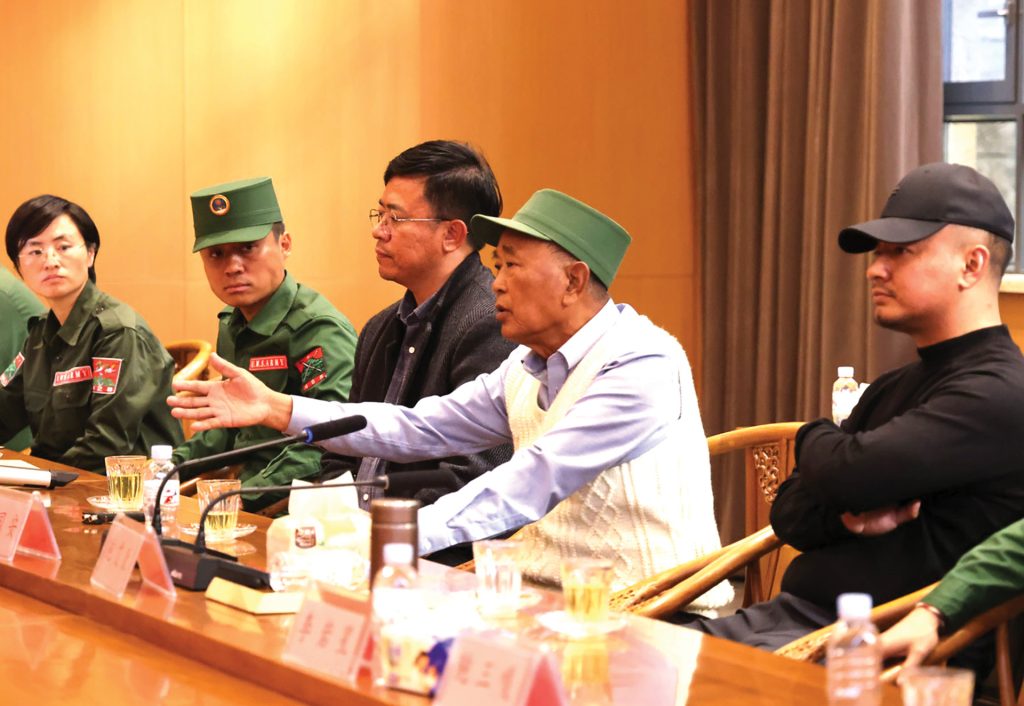Insight Email Vol-2 No. 2
This Insight Email is published on February 2, 2024, as a translation of the original Burmese language version that ISP-Myanmar sent out to the ISP Gabyin Community members on January 30, 2024.
EDITOR’S NOTE
This week focuses on the generational shift, “The Rise of Princelings.” The emergence of young faces during the latest Kokang (MNDAA) and United Wa State Party (UWSP) meeting was significant. There was a rarely seen female figure in the leadership meeting. This has all raised the question “Who’s Who?” in the emerging new faces of Wa leadership. Youth leadership has also been prominent in both the Operation 1027 launched by the Three Brotherhood Alliance (3BHA) as well as in the resistance forces that have emerged since the Spring Revolution.
Passing the torch in leadership to a new generation can lead to differing viewpoints and new strategies. The newer generation is naturally inclined to take creative risks instead of muddling in the same status quo. As the younger generation witnesses the fruits of their endeavors, their convictions and determination intensify. ISP-Myanmar sees this as the pride of “Princelings.” Those who do manage to achieve success in all of their effort, particularly in Operation 1027, may glorify the significance of their own convictions by their recent military victories. Under these conditions, conflict de-escalation may be difficult in Myanmar’s conflict landscape. In addition, the lack of existing bonds or connections between current military leaders and the opposing “Princelings” is also significant. Strangers who have never encountered adversity together may find it easy to annihilate the other without hesitation. This dynamic will likely shape the future conflict landscape. This generational leadership transition is a development worth to be closely monitored. ISP-Myanmar will feature this topic again in future publications when relevant.
Following “The Rise of Princelings” analysis, the “Trends to Watch” section discusses inflation in Myanmar. Lastly, the “What ISP is Reading” section focuses on the developments from the Davos World Economic Forum (WEF) including the Thai Foreign Minister’s policy speech on Myanmar and a discussion on the WEF Global Risks Report 2024.
KEY TAKEAWAY
The Rise of Princelings – 1
Fresh Faces of UWSP Leadership Emerge
This generational leadership transition is a development worth to be closely monitored.
A delegation representing Kokang Special Region No.1 led by Peng Deren a.k.a. Peng Daxun, the commander and leader of Myanmar National Democratic Alliance Army (MNDAA) paid courtesy visits to Wa State1 on January 24-25 and Mongla Special Region on January 27.
1 The UWSP and its alliances recognize the territory as Wa State, despite its official classification in the 2008 constitution as the Wa Self-Administered Division.
The visits coincided with the third month anniversary of Operation 1027 as well as the total takeover of Laukkai, the main warfare objective accomplished by the MNDAA before the memorial date of the passing of former Kokang leader Peng Jiasheng in February. The meeting was portrayed as Chinese New Year Eve visits, highlighting the maintenance and renewal of friendship ties developed by former leaders. An intriguing aspect of the trips was the emergence of new youth leadership faces.
This fact was noticeably remarked in a speech given by General Sung Kecheng, the Myanmar National Truth and Justice Party (MNTJP) Political Steering committee member and Kokang Special Region No.1 Administrative Committee First Secretary. He said, “we reviewed the revolutionary bond that has been forged between the MNDAA and UWSA and stated that the bond between Special Region No.1 and Wa people is strong due to the decades-long foundation built on a shared revolutionary path and that the friendship that had been forged with lives, and that blood and sweats will develop under a new generation of leaders and that Special Region No.1 will stand with the people of Wa forever.” MNDAA’s mouthpiece news media The Kokang conveyed his message in Burmese on its social media page.
Examining the news released from Wa, UWSP Vice Chairman Zhao Guoan took the lead alongside members of the Standing Committee of the Politburo of the Central Committee in the meeting to receive the delegation led by MNDAA Commander Peng Deren. On Zhao Guoan’s left was Bao Aikang, Deputy General Secretary, and Zhao Yannalai, Minister of the Department of Political Affairs on the right.
Prominently positioned were Bao Aikang, son of UWSP Chairman Bao Youxiang, and Zhao Yannalai, son of Zhao Nyi-Lai (UWSP founder and former leader who passed away in 2009). Positioned on the right of Zhao Yannalai was another Central Committee member, Bao Junlong, and on his right was Bao Youxiang’s personal secretary, He Ping. Notably, He Ping was the sole female figure in the meeting and is recognized as one of the leaders of the new generation. Seated on Bao Aikang’s left was Li Yanxing, a Central Committee member and Secretary of the Judicial Committee, and on his left was Central Committee Alternate Member Bao Sanga.
Observing the emerging UWSA leaders takes on new significance when revisiting the analysis provided in ISP OnPoint No. 17, released by ISP-Myanmar in November 2023. The analysis delved into the “Signaling Effects” of Operation 1027, examining power reconfiguration across three scenarios. The first scenario considered the replacement of Bai Xuoqian, a junta-appointed administrator, in the Kokang region with new leadership. The second scenario focused on conveying the subtext of “Do and Do Not” messages to the UWSA leadership with the growing Wa nationalism but publicly in the context of suppressing Kyar Phyant online gambling. Lastly, the third scenario explored China’s drive to strengthen its interests east of the Salween River.
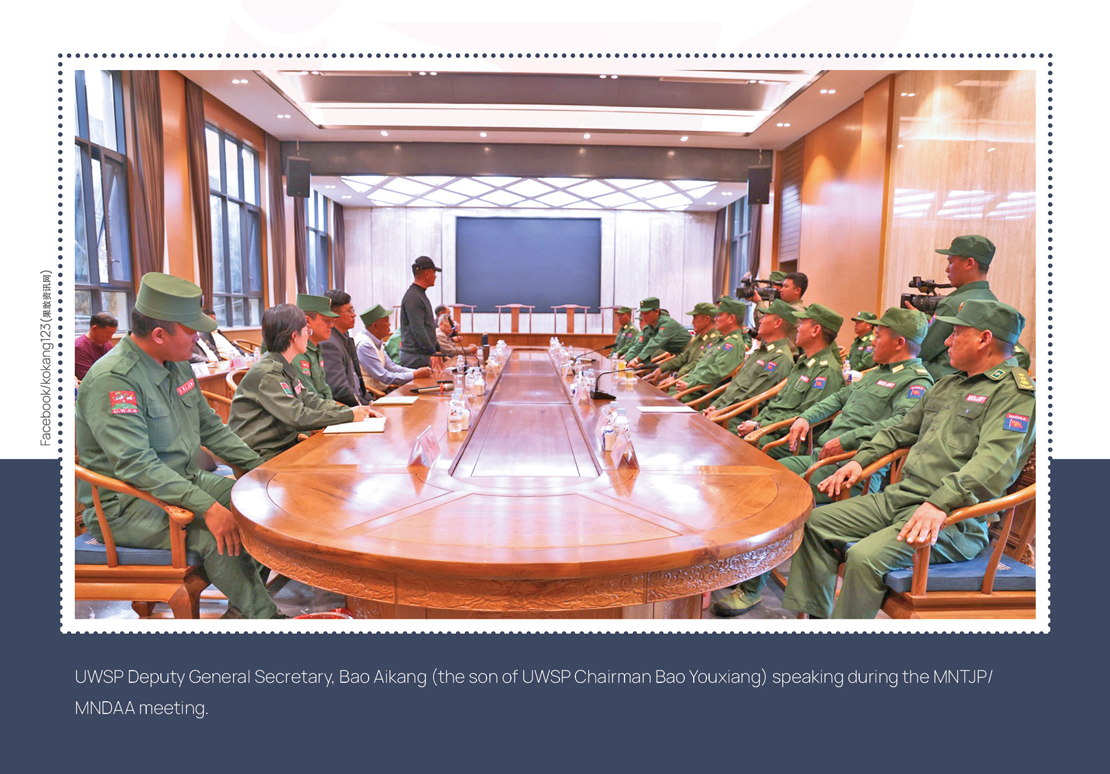
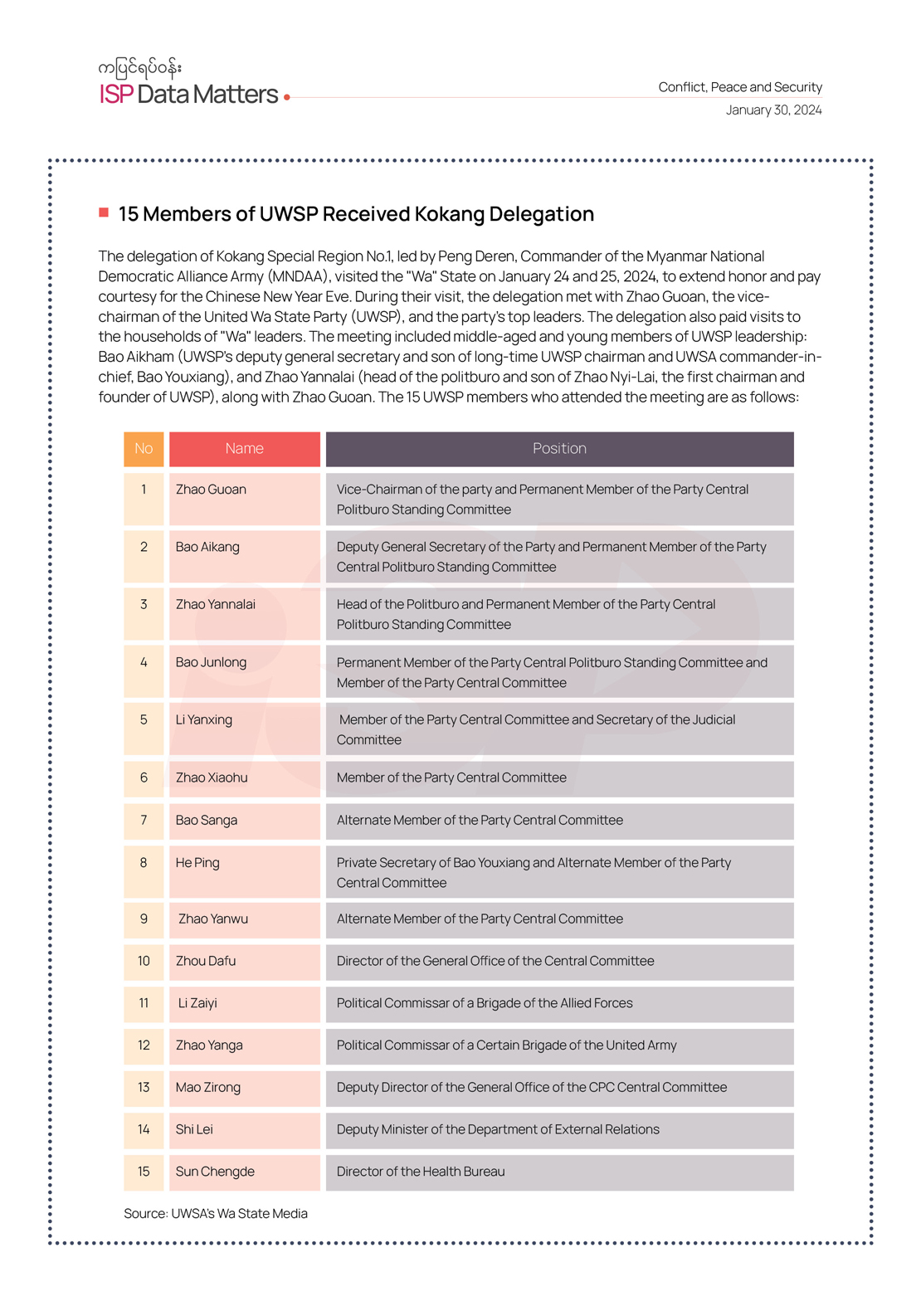
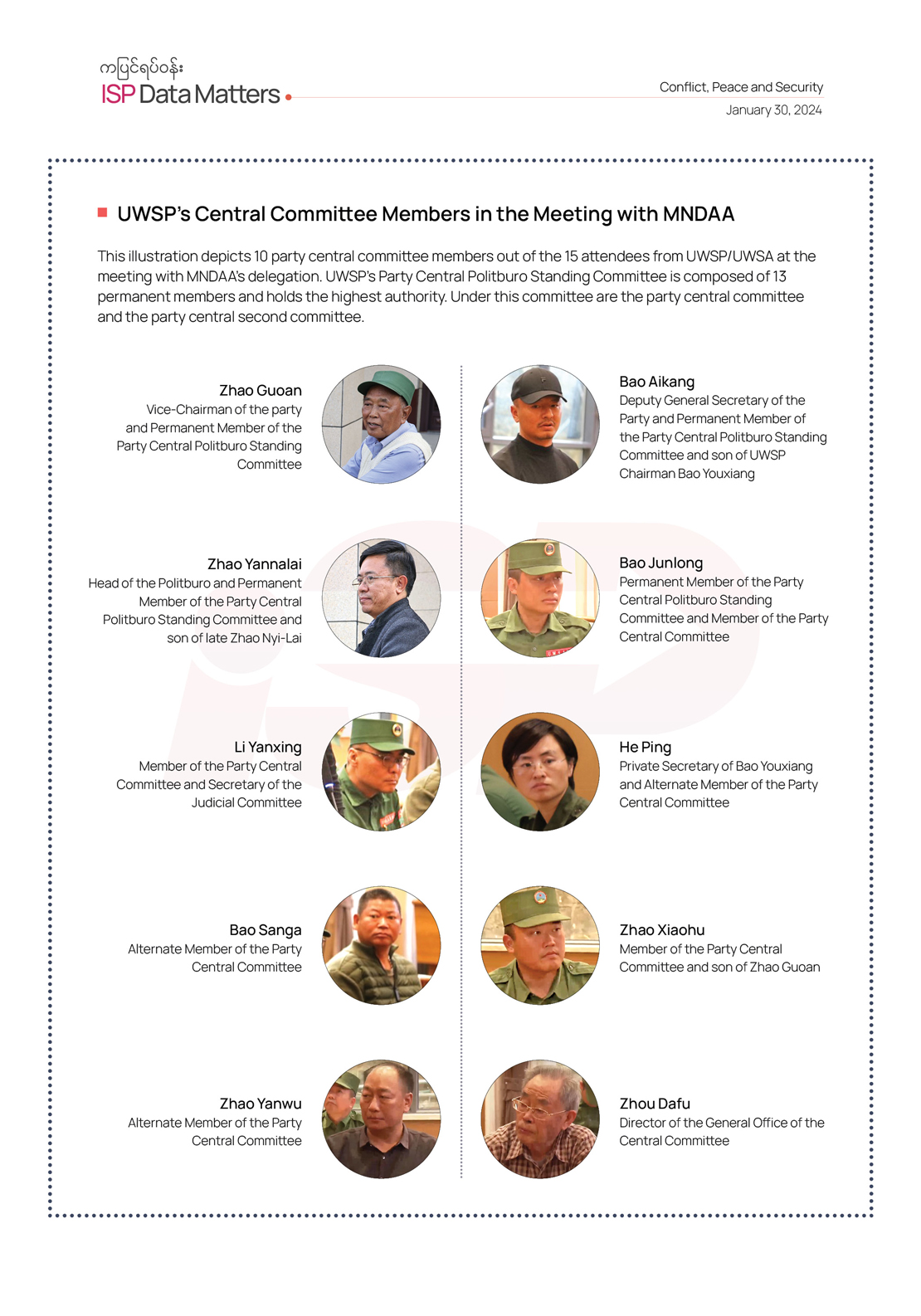
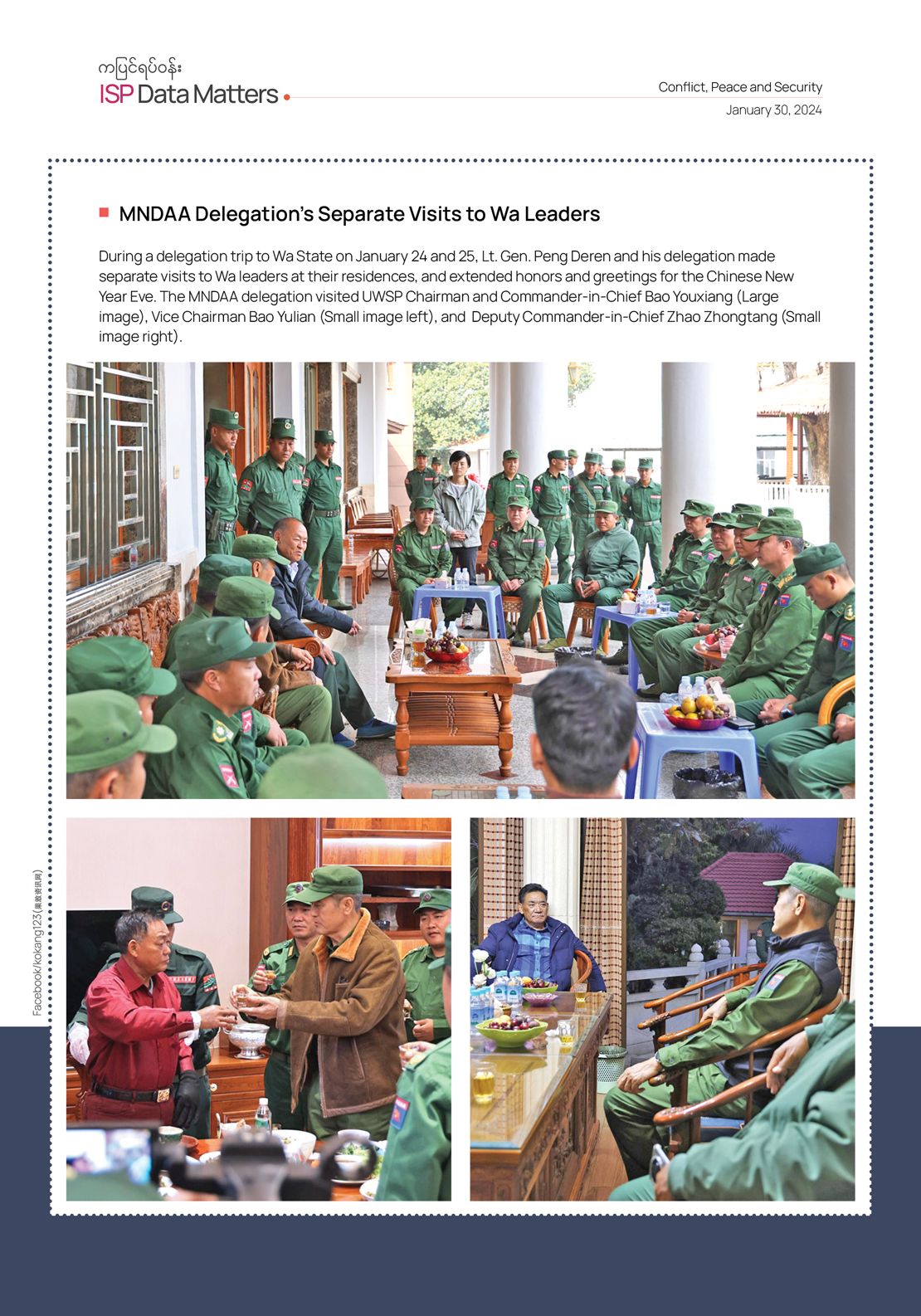
The second scenario is closely tied to the emergence of new leadership in Wa. In the analysis presented in ISP OnPoint No.17, it was noted that China would disapprove of the surge in Wa nationalism which “may be less likely to listen to China” under the current and future generations’ leadership. ISP-Myanmar’s research findings indicate that in Wa’s new leadership, members who prefer to focus on Wa identity and development, has become more visible than those leaders who were once Chinese volunteers and cadres sent by Chinese Communist Party (CCP) to assist Communist Party of Burma (CPB). For instance, He Ping, the only woman in attendance at the meeting with the MNDAA, was born and raised in Pengseng, the capital of Wa State.
Echoing the generational shifts witnessed in Wa, the rise of Generation Z can prominently be observed in the aftermath of the Spring Revolution that ensued after the 2021 coup. The similar trend can also be found with the emerging generation actively taking up leadership roles within Ethnic Armed Organizations (EAOs). Youth leadership is becoming apparent in the Three Brotherhood Alliance (3BHA), as well as the Karenni Nationalities Defense Force (KNDF), Bamar’s People Liberation Army (BPLA), and various People’s Defense Forces and Local Defense Forces (PDF/LDF) across the country. Generational shifts can lead to differing viewpoints and new strategies.
The SAC though, as evidenced by their response, clearly underestimates the developing dynamics in these generational shifts. Historically contrasting the military coups of 1988 and 2021 highlights the age differences of the military leaders. Snr. Gen. Than Shwe was only 55 years old during the coup and State Law and Order Restoration Council/State Peace and Development Council (SLORC/SPDC). SLORC Secretary, Lt. Gen. Khin Nyunt, was also in his late 40s. But Snr. Gen. Min Aung Hlaing was 65 (currently 68) in 2021 when he led the coup. This age difference comes with decline in agility, initiative, and innovation, unlike the SLORC/SPDC leaders that came before. Such a decline is also apparent when comparing current actions against 1988-1989 leaders. During those times, the leaders of the Kokang and Wa EAOs that had emerged from the defunct Communist Party of Burma (CPB) were in the same age group with Than Shwe and Khin Nyunt. They might share the perspectives due to this age similarity.
Hence, the first Ceasefire Crony Capitalism in Myanmar’s history (characterized by the ability to retain arms, collaboration with the military government for individual regional development, engagement in business, and involvement in activities such as the drug trade and money laundering) was established during the SLORC era, which has significantly shaped the entire conflict landscape, particularly in northern Shan State. However, the current actions of the SAC and its leadership can be analyzed as conservative as their decisions and procedures do not align with the present era. It only seems to be replaying what the military did in the past. While leaders of both generations share similar egos and drives for power, the current leader is handling his crisis in an old-fashioned manner.
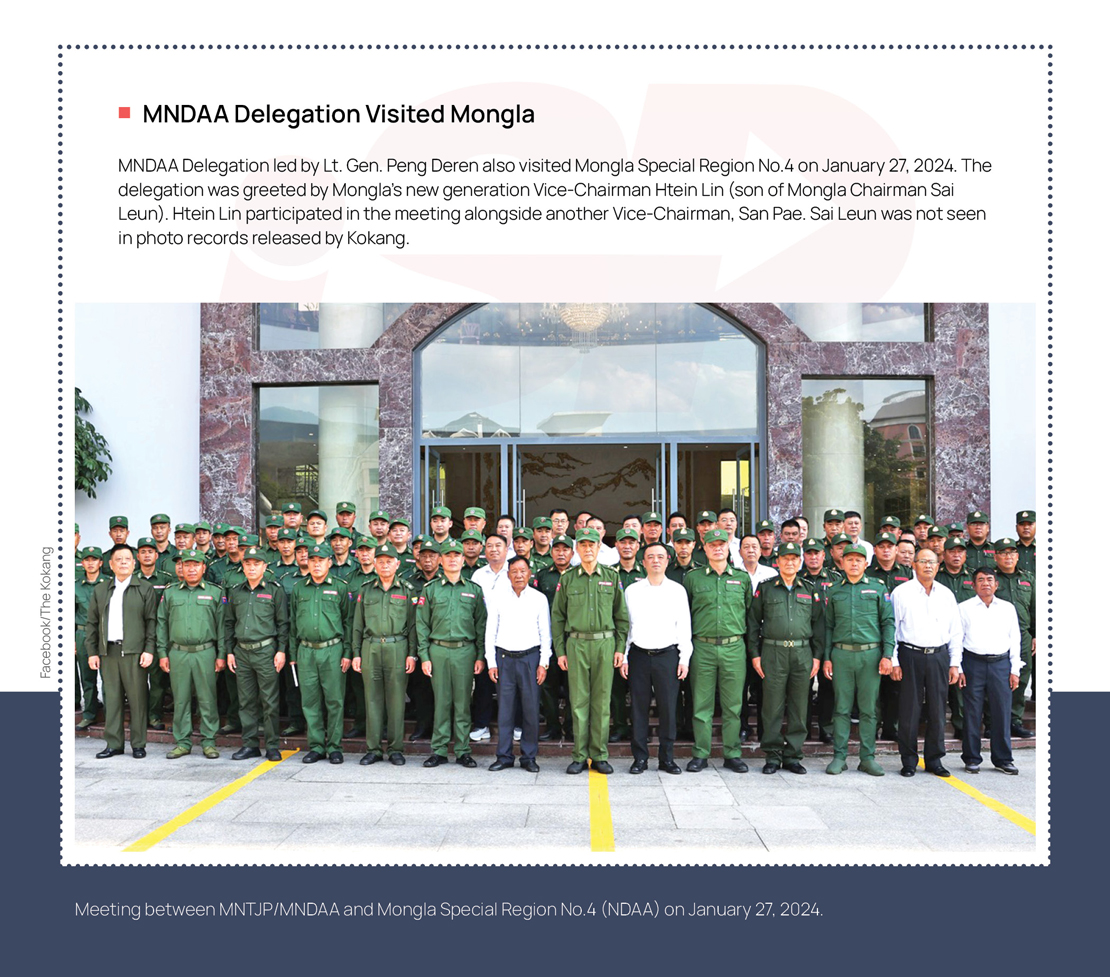
While the newer generation is naturally inclined to take risks and innovate, the older generation leans towards maintaining the status quo. As the younger generation witnesses the fruits of their endeavors, their convictions and determination intensify. ISP-Myanmar analyzes this as the pride of “Princelings” in this discussion. Under these circumstances, de-escalation of the conflict may be difficult and those young princelings may proudly manage to achieve their goals as their recent victories confirm.
After independence in 1948, a bond was developed between the government and revolutionaries who had fought together for independence. However, in the present scenario, the non-existence of bonds or connections between the current military leaders and the “Princelings” of resistance is worth considering. Strangers who have never encountered adversity together may find it easy to annihilate the other without hesitation. This can also be considered a new momentum of the conflict, which might eventually transform eventually changing the conflict landscape. This generational leadership transition is a development that must be carefully monitored by the SAC, fellow resistance forces, as well as regional countries who are looking for a resolution for the Myanmar crisis. This topic on “The Rise of Princelings” will be later discussed when relevant.
SPOTLIGHTS
The “Spotlights” section aims to provide a succinct overview of recent noteworthy issues. Five compelling issues from the past two weeks will be discussed.
Pope’s Appeal for Myanmar
Pope Francis acknowledged the sufferings of the Middle East, Ukraine, Haiti, and Myanmar On January 28. In his speech, he declared, “Wars are a disaster for the peoples and a defeat for humanity.” The Pope advocated for Myanmar’s peace through dialogue and the facilitation of humanitarian aid for those in need. He lamented, “For three years now, the cry of pain and the noise of weapons have replaced the smiles that once characterized the people of Myanmar.”
The Lady’s House Up for Auction
The State Administration Council (SAC) court has sanctioned an auction for the residence of detained former State Counsellor, Aung San Suu Kyi, a colonial house with sprawling 2-acre grounds, valued at 315 billion kyats (90 million USD). The property has been subject to an inheritance dispute spanning two decades, and the court’s decision will face legal scrutiny. Dissatisfaction arose in 2016 when the court ruled that the inheriting siblings should divide the property; however, Aung San Oo sought to split the proceeds after selling the whole estate. Despite a failed appeal to the Union Supreme Court in 2016, Aung San Oo later found success after Aung San Suu Kyi’s political status was revoked by the military. Criticism abounds as the decision was made while one litigant was imprisoned, lacking the right to defend or consult with lawyers. The auction is scheduled for March 2024, and Aung San Suu Kyi’s response to the case remains undisclosed. Designated by the National Union Government (NUG) as a part of Myanmar’s heritage, the property has hosted visits from international leaders, including former President Barack Obama, local politicians, and artists. The NUG has declared its intention to take action against those involved in the auction.
SAC Rekindling with ASEAN
SAC sent their representative to the ASEAN Foreign Ministers Retreat on January 28 and 29 in Laos. This is the first time SAC sent a non-political representative of Myanmar to attend the meeting since the coup. The SAC has openly criticized ASEAN for only inviting non-political representatives to attend the meeting previously. At the beginning of this year, the Laos ASEAN Special Representative visited Myanmar and met with the SAC’s military leadership. Subsequently, the SAC has only sent their representatives to ASEAN since that meeting. The statement after the meeting mentioned ASEAN to hold on to the Five Point Consensus (5PC) to resolve the Myanmar crisis.
War Insights
Karen and revolutionary forces seized the SAC camp in Ban Chaung area in Dawei Township. The battle initiated by the Karen National Liberation Army (KNLA) with local People’s Defense Force (PDF) lasted 24 hours. This was the first seizure of a camp in Tanintharyi Region. At the same time, warfare also reignited in southern Shan State by the Pa-O National Liberation Organization/Pa-O National Liberation Army (PNLO/PNLA), which had previously signed the NCA. The PNLO/PNLA engaged with SAC battalions on January 26 and asserted control over Hsihseng. Other Pa-O forces and Karenni revolution forces joined hands with the PNLO. This indicates that warfare is spreading towards Taunggyi, the capital of Shan state. A few days later, Karen revolutionary forces shot down an SAC helicopter by sniping the pilot. The resulting helicopter crash also killed a sergeant and other officers. The SAC though reoccupied Momeik town which the Kachin Independence Army (KIA) and PDF had previously controlled. The KIA in recent days also seized SAC’s camp near Man Wein Gyi village located at the Sagaing Border and another camp near Nam Hpat Kar village along the Kutkai-Muse Road. There are also news reports that China is involved in the ceasefire effort in Rakhine State where battles have been occurring for over two months. Conflict has since reduced due to China’s intervention in northern Shan.
Rohingya Perished at Sea
The United Nations High Commissioner for Refugees (UNHCR) disclosed in their January 23, 2024, statement that the distressing toll of 569 Rohingya lives lost while attempting perilous sea journeys in 2023– a staggering increase of 200 from the previous year. As they sought refuge for a better life, the unforgiving waters of the Andaman and Bengal Oceans claimed their lives. The over 4,500 Rohingyas undertaking these sea crossings last year were predominantly women and children. An alarming statistic emerges as one out of every eight individuals on average is lost at sea. Survivors, upon reaching safe shores, face additional hardship including sexual assault and discrimination. They also face being stopped from entering upon reaching the shores. The UNHCR has emphasized the urgency of addressing this humanitarian crisis and called on coastal authorities to extend support to the Rohingya community, with the objective of averting further tragedies.

TRENDS TO WATCH
Inflation, Inflation, Inflation
The Economist Intelligence Unit (EIU) predicted Myanmar’s estimated inflation would rise over 40% in the first quarter of 2024.
Many nations have faced inflation crises in recent years. Such crises stem from a convergence of problems, including that many countries spent lavishly on bailouts, economic stimulus, price spike in the oil and other inputs, instability in the banking system, consumer uncertainty and the ongoing consequences of Covid. Regarding the rise in inflation, Venezuela in 2023 faced a 360 per cent rise while Turkey faced 85 per cent in 2022. The global inflation rate in 2023 was 6.9 per cent.
Myanmar shares similarities as well as differences when it comes to inflation. The Economist Intelligence Unit (EIU) estimated Myanmar’s inflation rate would be between 7.6 to 15.8 percentage points in 2024 through to 2025. On a year-on-year basis, inflation is expected to rise to around 40 percent in the first quarter of 2024. The evidence is everywhere, with every price skyrocketing. The nationwide conflict also contributes to the inflationary pressure. At the same time, the SAC last December liberalized some extent to foreign exchange rates regime. This all impacts inflation, which has only faced an upward trajectory since the coup in 2021. Unsurprisingly, food market prices have also risen. While September-October initially saw a slower rise in inflation due to the forced control of the SAC, supply chain constraints, and limitations in both goods stocks and foreign exports, December brought new challenges with a shortage of gasoline and soaring prices. These economic facts lead nowhere but inflation.
Inflation has negative consequences for society and politics. This basically means large sum of money is following a few goods, which could cause scarcity such as imported goods and medicines. The Myanmar public’s political dissatisfaction with the SAC could also grow due to such societal suffering. Rising global oil prices and conflicts in the Middle East cannot be solved by domestic politics. The SAC can only solve the problem of public debt by printing more money. Furthermore, international sanctions also impact commodity prices.
Myanmar’s population could become further impoverished due to the rise in commodity prices. To make a living will be difficult. Consequently, the number of migrant workers could increase. The rate of migrant workers has already been slightly impacted by the civil war. Unconfirmed estimates suggest that there are over 10 million Burmese migrant workers in Thailand.
Electricity outages also make it difficult for businesses to maintain production and revenue. The World Bank’s Myanmar Economic Monitor Reports have suggested the production rate will be slow in Myanmar due to macroeconomic instabilities and the protracted armed conflict. World Bank estimates on Myanmar’s GDP growth rate has been reduced to one percent. Generally, GDP growth causes some inflation. However while GDP stagnant and inflation continues, as stagflation scenario could occur in Myanmar, that is, a cycle of slow economic growth and high inflation. In such a scenario, the public would face higher unemployment and lower wages.

WHAT ISP IS READING
Davos Forum and 2024 Global Risks
The Deputy Prime Minister of Thailand noted the pressure that the Myanmar crisis is having on ASEAN countries amidst the worrying situation in Ukraine.
The World Economic Forum (WEF) convened from January 15-19 in Davos, a resort town in Switzerland. While renowned for its global impact, the forum faced criticism for fostering discussions on global developments that seemed to underscore the influence of elites driving the world. Global leaders, entrepreneurs, and experts gathered, prompting negative reactions to the perceived concentration of power among the privileged few.
Last year’s most discussed topics were cryptocurrency and the Ukraine war, but this year’s topics focused on Artificial Intelligence (AI). OpenAI’s CEO, Sam Altman, who recently faced controversy also attended the forum. War still cast a shadow on the forum as both Ukrainian and Israeli presidents, Volodymyr Zelensky and Isaac Herzog, hosted dialogues. Another matter of discussion was America’s presidential election and how the world could be shaken if Trump were to be reelected. Despite COP28 having recently been convened, climate change issues were very much relegated to the rear. Additionally, war and inequality issue in Gaza and Ukraine was discussed.
Another intriguing matter was the Global Risk Report. Prior to the forum, 1500 global leaders’ take on global risk was surveyed and reported.
There was also an important sideline matter on Myanmar. WEF on January 16 held a discussion titled “Diplomacy Dialogue on Myanmar: Preventing a Lost Decade.” The Deputy Prime Minister and Foreign Minister of Thailand, Parnpree Bahiddha-Nukara, discussed his country’s position and objectives. This is the first known Thailand’s policy speech on Myanmar. Mr. Penpree further noted the pressure that the Myanmar crisis is having on ASEAN countries amidst the worrying situation in Ukraine. The current Myanmar crisis is complicated and multiple layers continue to form as the conflict intensifies and deepens. The protracted conflict shows no sign of ending and ASEAN regional countries fear that Myanmar is becoming fragmented and could become an arena for major-power competition. ASEAN maintains that the Myanmar crisis needs to be resolved through the Five-Point Consensus. Regional countries though are offering bilateral support. He said a process of genuine dialogue and reconciliation between the Myanmar military and opposition parties is important. If not, there will never be a lasting peace. However, this process must be led and owned by Myanmar. Thailand’s immediate goal as a neighbor of Myanmar is human security. The agenda includes increasing humanitarian support, relief efforts and improving humanitarian diplomacy.
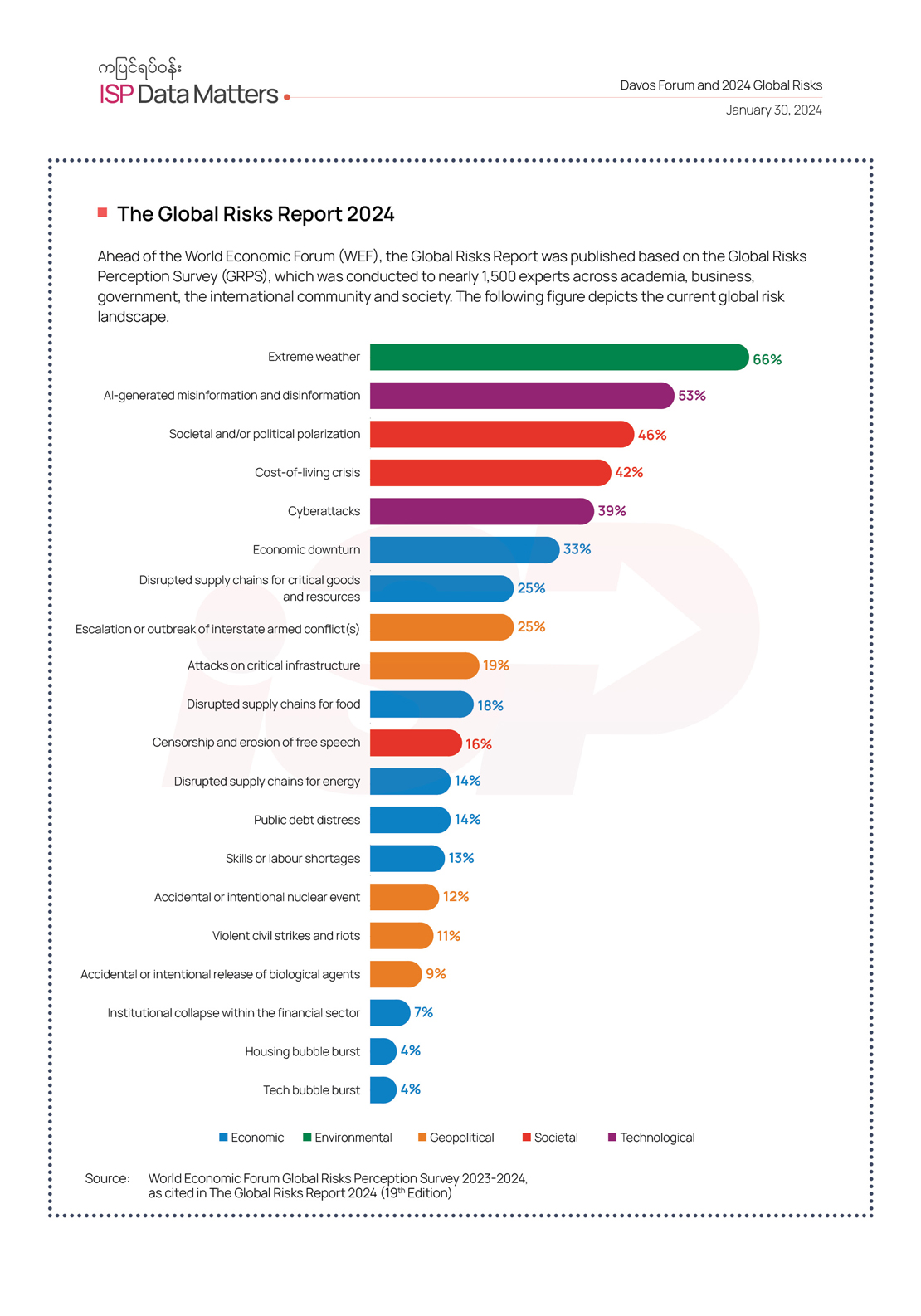

To receive ISP Insight Emails in your inbox, subscribe at this link.

